The Way It Is/ Some fond memories of Carl Haasby Gordon Kirby |
 Carl Haas has passed away after a long illness. Haas, 86, was one of America's most successful race team owners who enjoyed wide influence in his other roles as the country's most prolific race car salesman and chairman for many years of the SCCA's board of governors. He also promoted races at the Milwaukee Mile and sat on Road America's board of directors.
Carl Haas has passed away after a long illness. Haas, 86, was one of America's most successful race team owners who enjoyed wide influence in his other roles as the country's most prolific race car salesman and chairman for many years of the SCCA's board of governors. He also promoted races at the Milwaukee Mile and sat on Road America's board of directors.
Carl owned and operated Newman/Haas Racing from 1983-2011 in partnership with Paul Newman who lost his battle with cancer in 2008. Haas ran the team out of his base in Lincolnshire, Illinois and Newman/Haas is ranked second only to Team Penske on IndyCar's all-time winners list with a record of 107 wins, 109 pole positions and eight championships. Haas's statistics are even more impressive when you add his team's 39 Can-Am and Formula 5000 wins and seven championships from the nineteen-seventies and early eighties. Haas caught the racing bug in 1951 when a friend took him to a road race through the surrounding roads and streets of Elkhart Lake. The race was a forerunner to the creation a few years later of the great Road America road course but that summer day in 1951 caught young Carl's imagination and he was soon racing an MGTD in SCCA club races. 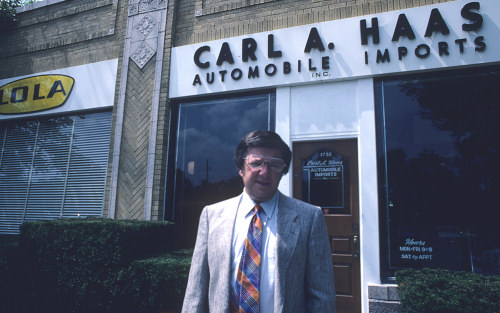 © Racemaker/David Huson From Chicago's north side, Haas won some races aboard his MG and soon traded up to a Porsche spyder. Through the fifties and early sixties Haas established himself as a race-winning amateur SCCA sports car racer and began to make his name buying and selling sports cars of all types. He eventually started a business called Carl Haas Auto which sold Elva, McLaren and Lola racing cars and Hewland gearboxes and parts. During the sixties and seventies Haas Auto grew into the USA's largest seller of road racing cars and components to booming SCCA club and professional racing markets. After retiring from driving Haas started running a race team in 1967 competing in the SCCA's United States Road Racing Championship and the Can-Am series. His first driver was Masten Gregory followed by Chuck Parsons, Peter Revson, Jackie Stewart, David Hobbs, Brian Redman, Patrick Tambay, Alan Jones, Jacky Ickx and Mario Andretti. Between 1971-'80 Haas's cars won 39 Can-Am and Formula 5000 races and seven championships. During this time famed actor/racer Paul Newman ran his own Can-Am team, buying cars from Haas. But the 'new era' Can-Am seres was in trouble and in 1982 as the series stumbled Haas proposed to Newman that they become partners in a new CART Indy car team. Initially, Newman wasn't interested. In fact, he was ready to get out of owning or operating a race team until Carl told him that Mario Andretti was available to drive. They were surely one of the oddest couples in motor racing history, if not sport of any kind. Newman and Haas were polar opposites in all ways except for their shared passion for motor racing. Despite his success Haas was a shy fellow, a man of few words who was hard to get to know. He had little or no public image, entirely the opposite of Newman who was one of the world's most renowned and accomplished movie stars, an eclectic human being with a wide range of interests who evolved into one of the world's leading charitable givers and a champion for disadvantaged children. 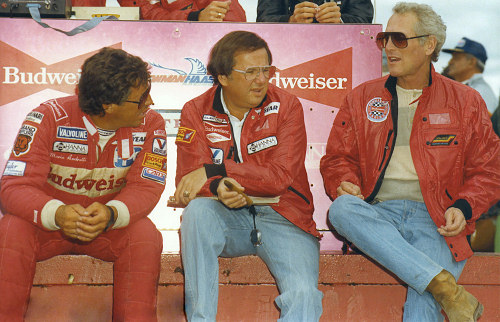 © Racemaker/Hutson The marriage between Newman and Haas was consummated near the end of 1982 and Andretti raced the team's Lola in 1983, winning two races and finishing third in CART's Indy car championship. The following year Andretti won six races and swept to the championship as Newman/Haas began to write its way into the history books. Mario was the team's only driver and its driving force for six years before he was joined in 1989 by son Michael who won Newman/Haas's second CART championship in 1991. Formula One world champion Nigel Mansell drove for Newman/Haas in 1993 and '94 and Mansell took the team's third championship in '93. Mario retired at the end of 1994 and Newman/Haas's fourth championship came in 2002 with Cristiano da Matta driving. Da Matta's championship was followed by a remarkable string of four consecutive Champ Car championships with Sebastien Bourdais from 2004-'07. "Carl surrounded himself with winners through his whole life," Mario says. "Look back at his history throughout the Can-Am, Formula 5000 and then Indy cars. He always reached for the best in the business to associate himself with. That's one quality that I respected Carl for tremendously and that's what spelled success. "Look back at the individuals who drove for him and the individuals who worked for him. They were the best--Jackie Stewart, Jacky Ickx and Brian Redman. And the best engineers and team managers--Adrian Newey, Tyler Alexander and Tony Cicale. Carl drew from the cream of the crop. "Carl would always make the choices to surround himself with the best people and keep them. That's another thing that's to Carl and Berni's credit, the fact that they had continuity of key members in the team. To me. that's huge. You look at the success of any teams in the history of our sport. No matter where you go there's continuity in the key people, and that's what Carl and Berni always maintained at Newman/Haas. "I always felt that was essential and important so that the culture of the team remained throughout its history. That's why they were strong and successful and have the championships to show for it." 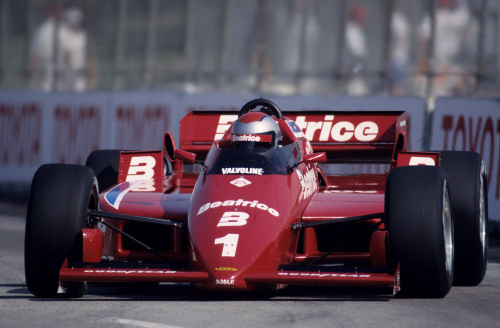 © Racemaker/Paul Webb "The thing that I appreciated always from day one about Carl was the fact that he was a hundred and ten percent racer," Mario says. "He was an icon in the sport because he was a part of Lola and Hewland, two manufacturers who were so important in the broad history of our sport in the United States, and he depended on the sport a hundred percent for his financial success. Carl was a hundred percent involved in racing. That was his only focus every day. "Any suggestion that I would make Carl never hesitated. He might have had the label of being frugal, but he was frugal in some of the areas where it looked to him like waste. But he was never frugal about paying for the best talent that he could get. Historically, his drivers and engineers probably were the highest-paid in the business." Mario also underlines Berni Haas's roles in Carl Haas Auto and Newman/Haas. "Another important point is the old adage that behind every great man there's also a great woman. Berni Haas was always a quiet but big supporter of all aspects of the business and the race team. Carl had a wonderful teammate in Berni who shared everything and was part of all decisions but never in the limelight. Berni was always happy to be very quiet and in the background. You never saw Berni on the podium or taking photo opportunities. But she was a driving force. "She deserves all the accolades possible but she would never be one to speak to the media or to come forward in any way to be recognized. Berni was Carl's teammate and soulmate one hundred percent and a very strong driving force behind the team. "Berni was an incredible stabilizing force behind it all. She was very cool and collected. I think she would be the one who would probably show the least emotions. She was a great partner for Carl in making a lot of key decisions, no question about it. "And of course Paul Newman was a truly great man. He was a tremendous human being, a great actor and artist, and a racer through and through. Paul also became a very close friend and in many ways he was like Berni--quiet, in the background, but always there for you whenever you needed his support. Carl, Berni and Paul were a fantastic combination and I'm proud to have been a part of what they created and achieved." 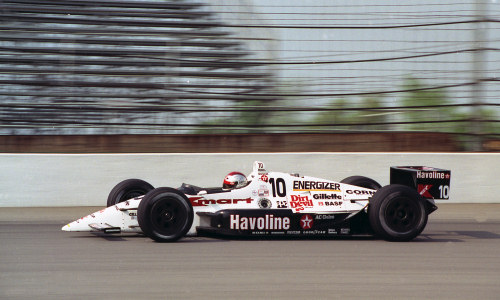 © Racemaker/Dan Boyd "Carl was one of the most unique people you were ever going to meet," Michael says. "Some days you just wanted to hate the guy but then the next day he would do something to make you laugh. He was Mr. McGoo. That's the best way to describe Carl. He really was Mr. McGoo. He would go cruising down the road and have pile-ups behind him. I loved him for that. Sometimes you wanted to hate him, but you still loved him. "Being on this side of the fence as an owner I've gained a lot more respect for Carl and Berni and the way they did things. When you're a driver you see things way different. But when you're on this side you understand things a lot more and why he did things the way he did. This is a very tough business and for Carl to be successful over so many years was very rare and very impressive. I had a lot of respect for him." Michael also emphasized Haas's deep commitment to the sport. "He was a big, big part of the history of American racing for many years," Michael declared. "He sold a lot of cars and parts to a lot of people and he made a great living out of it. But he gave a lot to the sport. He had a huge impact. "The thing I really liked about Carl was he really seemed to listen to ideas and I came in there with a million of them! And he did most of them and one of them was making it an engineering-based team. That was something I liked from the beginning about Carl. He listened and he responded to the ideas you put forward. He was always trying to make it better. "One of the things I learned from Carl that stuck out was people. He would do whatever it took to get the right people for the job because in the end he knew that was the difference. Sometimes it was a bit of a struggle to get him to commit resources to some things but when it came to people he would do whatever it took and pay whatever it took to get the right guys. "I pushed hard to get some people in there. I'd give him suggestions and he'd go full force to get them. In the end I think that's where Carl's real success came from. He always had good people. That was always the difference and he kept the continuity for sure. That was definitely a big help. "The other thing is Berni was a way bigger part in all of it than people think. Berni and me had a great relationship. I thought we were always pretty close with each other. We had a good relationship. But she ran a lot of the show in the background. She was tough, but you've got to be tough in business." 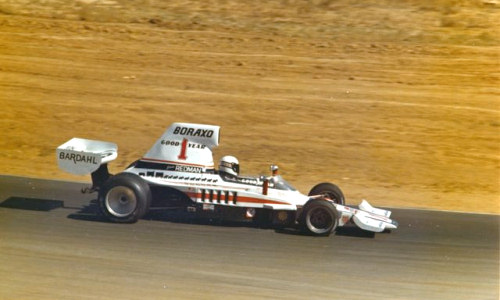 © Racemaker/Torres "Our partnership turned out to work great because Carl just freed me from the responsibility of having to spend any time raising the money or dealing with the sponsors," Hall says. "I was able to concentrate on the race team and the race car development, and that's the part I like anyway. So the way we started was a good combination. "It turned out to be a really good combination in a lot of ways. It took the responsibility for raising the budget off of me and Carl did a great job. I was really pleased that he wanted to join with me and pretty much let me have the run of it as far as running the cars. It was a great deal for me. "There was a plan and it was executed. Carl and I framed it and I was the guy involved in making the development and decisions about maintenance on the cars. It was a hard-working part of my career and it was very successful. We did a hell of a job and I'm proud of it. It was very successful. In fact, it was the most successful series that I've ever been involved in." Renowned as the world's greatest race car designer of modern times Adrian Newey worked for Newman/Haas in 1987 as Mario Andretti's race and development engineer. "Carl was very good to work for," Newey says. "He was very straightforward, very easy and he was very sharp. He knew exactly what was going on and if you wanted or needed something technically he would do whatever was required to make sure that was provided. He was a very good guy to work for. I enjoyed my time there. "He had his eccentricities of course. I remember us walking to a restaurant one evening and he fell over on the pavement. All these nickels and dimes rolled out of his pockets and he scrabbled around like mad and insisted on picking-up every last one of the coins. 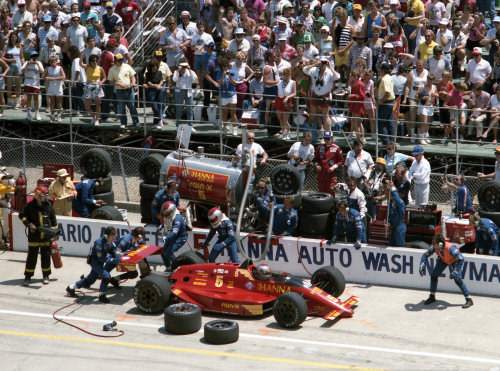 © Racemaker/Paul Webb "He tried that and it didn't work so I said, 'What about Berni's birthday?' He tried again and that didn't work. So we had to get a taxi and it later turned out that the code was at 0-0-0. It was a new car and he hadn't done anything with it. "The good thing about Carl was he was always prepared to laugh at himself in those situations. He didn't get pissy or precious. He would see the funny side of it and take it on the chin. "The refreshing thing about Carl and those days," Newey adds, "was that people did what was right rather than turning everything into a game of personal gain all the time. What impressed me about Carl was that he was a genuinely nice guy who had tremendous loyalty to his people." Brian Lisles worked for Newman/Haas for more than twenty years. He was Mario Andretti's engineer before serving as the team's general manager. "I never had a contract with Carl," Lisles says. "We agreed things and it always happened. He was very supportive of people who had helped him. My wife was very sick for two years before she passed away and basically, he told me, 'You've got to look after your wife. Come into work when you can.' I didn't work a full week for two years and it was never an issue other than he reminded me a few times that maybe I needed to go home to see my wife. Carl had a lot of humanity which I don't think a lot of people realized. 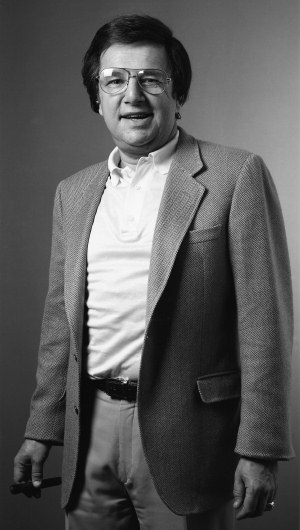 © Racemaker/Gold&Hutson "The thing about Carl was that he aspired to the best in all things not just his race team and aspiring to the best in racing and to win races. He aspired in all things and he was very good at seeking out people who were experts in their field and listening to them and making a balanced judgement on what they said." Over the years Haas accumulated an impressive collection of art which adorns the walls of his home in Lake Forest. "Carl was a connoisseur of various forms of art and made a good business of being a connoisseur," Lisles remarks. "He made some very astute moves over the years in the art world and enjoyed what he had and made it work for him, and also in other ventures he came across. He knew a lot of people and they talked to him and he listened and saw his own business deals. If he thought he was getting good advice, he acted on it. He didn't mess around. "He wasn't an entrepreneur like Roger Penske, but he was quite an entrepreneur in his own way. It was always interesting to talk to him about some of his interests outside racing and some of the things he had done over the years. "Berni was the quiet power behind the scenes. Carl was a big picture man. Berni made sure all the pennies were counted and that money was not wasted. She was extremely good at it and very dedicated to it. But also they were a very strong couple. They were very concerned about each other. They were a good couple who lasted a long time. "It wasn't apparent when you first met them. In fact, it kind of looked the opposite. You didn't quite understand where their lives touched, but when you worked with them and were with them for some time you realized that they were very intertwined with each other." Lisles ruminated on what made Newman/Haas and Carl Haas Auto such successful enterprises. "Carl thought long and hard about all the big decisions, a lot more than people realize," Lisles observes. "He put a lot of thought into it. He found out as much as he could about anything and would worry on it as long as possible before he made his decision. It's the old story. You get what you put into something and Carl certainly put a lot of effort into all his decisions both in racing and his other businesses. 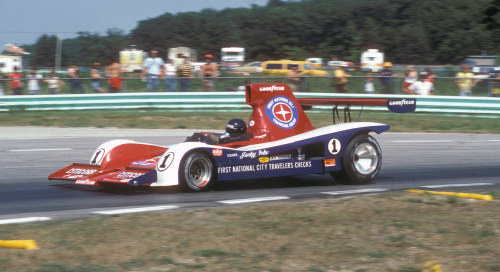 © Racemaker/Marc Sproule "He'd say, 'This is how I see it.' And he'd give you a twenty or thirty minute exposition of the entire political, business and sporting scenario that you were dealing with. It was completely thought through and very balanced. It was obviously something he had thought about a lot, not just ten minutes before you came into the office. He did that many times over the years. He had a complete view and vision of whatever the situation was. "He wasn't always right. But most of the time he was right and most of the time it was a very fair evaluation, not necessarily skewed to his own personal needs, which is why I think he was successful over the years." Jim McGee was Newman/Haas's team manager in 1993 and 1994, the two years Nigel Mansell drove for the team beside Mario Andretti. "Working for Carl was great," McGee grins. "He was probably one of the best people I worked for. There was no bull with him. He was smart in so many ways. He just made your life easier. He never got upset. He was cool and provided you with everything you needed. Carl probably was as good as there was. He ran a good operation. He had a lot of good people working for him in the race shop and in the office. I cannot remember one unpleasant incident during my two years with Carl. It was a good operation and I enjoyed everybody there. "The way the place was set up was pretty nice because you could see most of the offices from the lobby and you knew who was there and who wasn't. Carl was there all the time. He was there in the morning when you came in and then Berni came in a little later in the morning and she stayed into the evening. When you left at night she was the last one there, so Carl and Berni were represented there all the time.  © Racemaker/Sproule "At the end of every month I would get all of the receipts, bills and invoices and go through them. Then I would have to go into Carl's office and sit down with him and we would go throw the bills together. And he would question you. 'What about this? Do we have to spend that much?' You would have to go through an inquisition. 'Do we really need that? You know, you're killing me!' "Every once in a while he would light up a cigar. Most of the time he only chewed on them, but occasionally he'd light one up and one time we were going through the bills and he lit up a cigar. Well, the phone rang and I can't remember who it was, but it was not a happy call. Carl stood up and yelled and threw some papers down and was puffing away in his cigar. He got so mad he threw his cigar in the trash can, which was full of paper, and all of a sudden there was smoke and flames coming out of the trashcan. So Carl put his foot in the trashcan to stamp out the fire. It was hilarious! "When Carl was on the scoring stand he always had his own sheet of paper in front of him and he would write stuff down. He would write, 'luck' or 'love' or 'hell'--things like that. He believed in wishing well on things. That was part of Carl's way of life. "Everybody at Newman/Haas was happy. A lot of times you have factions at race shops. You have a group complaining about how screwed up things are, but you never had that at Newman/Haas. You always had to bridge the gap between the engineers and the mechanics. There are always complaints from the mechanics that the engineers don't know what they're doing but that was minimal at Newman/Haas. The engineers, Brian Lisles and Peter Gibbons, had a good rapport with the mechanics. It worked well. "Paul (Newman) was never in the way," McGee adds. "That's what we used to say about him. You never knew he was around. He was always there to add his two cents whenever needed, but he never said too much. He stayed in the background and let us do our thing. He just supported everything we did, which was great." 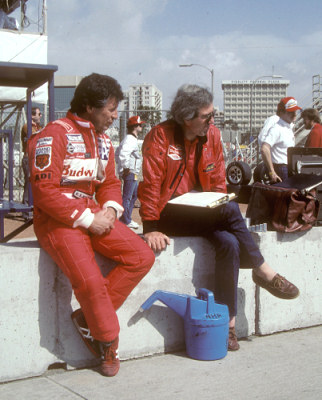 © Racemaker/Sproule "I never got really that close to Carl, but I really liked him," Cicale remarks. "I never had a contract with Carl but I never had a contract with any of the individual team owners I worked for. I always trusted Carl in spite of the reputation he had of shady dealings. I never experienced that with him at all. He was always a hundred percent upfront and straighforward with me. What he said is basically what he did. At times he tried to backtrack a little bit, but when you pointed out what had really been said, he agreed. He was always a man of his word. He was always honest and straightforward. "I think he always did what was beneficial for the team. He was really truly a racer at heart. He loved racing and he loved the personalities in racing. But above all he really loved winning and he loved putting together an organization in spite of trying to do it on the cheap quite often. But if he needed to spend the money he would spend the money. You had to sit down in a corner with him and sometimes beat him to death to get it out of him, but there were no grudges that I could ever detect with Carl, which was always a nice thing. "He always treated his people very fairly and I think that's pretty obvious because of the large number of people who had been with him for many, many years, probably a lot longer than any other organization or team. People stayed with Carl because, in general, he left the team alone. He hired good people and he let them do what they thought was right. He hired very, very good drivers of course, and I think he understood how to win. "He had a fantastic, long history filled with really unique characters. I think unlike any race team I've ever been associated with, the most unique, obtuse people have worked for Carl. I don't think any other team is even close in the diversity and uniqueness of the people who have been attracted to that organization." Cicale told a couple of funny stories about Haas. "We were at Indy and we were sitting down talking with Keith Duckworth. It was probably 1983 and I remember sitting under the tent and he was smoking his perpetual cigar. He was leaning back in his chair and the three of us were talking. Carl was sitting on one of those folding lawn chairs and he was talking away a mile a minute. 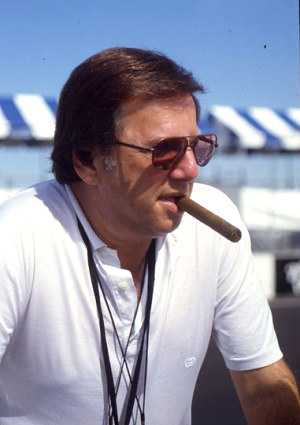 © Jutta Fausel "Another time at Elkhart Lake was a similar type of thing in the sense that he could totally, absolutely embarrass himself by doing something really crazy or stupid and not even think about it, not even miss a beat. We were testing at Elkhart and he came up for the test. It had been raining and the paddock was muddy beyond belief. This was before they paved the paddock at Elkhart and when you got those torrential summer rainstorms the mud was just atrocious. "Carl was in the back of the truck and he was wearing a brand new beautiful set of expensive loafers and he didn't want to get them wet. But he wanted to come outside into the rain and talk to us so he walked out onto the tailgate of the truck and hopped from there onto one of the wooden posts that held the armco in the pit lane. He got one foot on the post, slipped off and went backwards into a vat of mud! He was smoking a cigar and had a suit on and he was completely covered in mud. And again, he got up and walked over to us like nothing had happened. "He kind of ran his race team a little bit like that. It was a little on the loose side but yet in control, and I think Carl was always like that. He was a little on the loose side but always in control. He was a gambler and liked gambling, but he wasn't a wild gambler. He wasn't a really huge gambler. He was more of a speculator than a gambler. He liked to go out on a limb and if the limb broke, well okay, no problem. We'll do something else. "Carl was definitely something else. He would do whatever he wanted to do when he wanted to do it. If it was foolish or not, he wouldn't even think twice about it or apologize for it. He would just get on with the program. He was always like that. He was such a unique character. I admired Carl more than anything else for being true to his own unique personality. I liked that most about him. He was a very unique individual and he never apologized for it. "He never pretended not to be unique, never tried to be unique on purpose. He was just that type of character. What you saw was what he was all about and he never apologized for it at all. The characteristics that I remember the most about Carl were his true uniqueness as an individual with no pretense at all about him. There were no apologies for anything about the way he was. 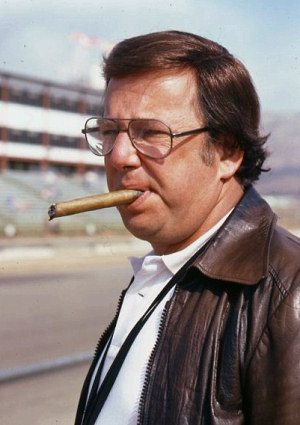 © Jutta Fausel "Berni was always a good, stabilizing influence. She knew Carl's quirks. Sometimes people would get upset with him and often she would smooth the situation out so it wouldn't get out of hand. I think she was the reason things didn't get out of hand a lot of times. Carl could be a little weird at times and you'd get a little annoyed and frustrated with him. He'd threaten this or that but Berni would come in and settle the whole thing down. Carl would settle down and you would settle down. "Berni was a really good negotiator. She never complained and always was a pretty positive person who listened to your stories and listened to your complaints. It was a great place to work. I have very fond memories of Newman/Haas Racing." Many race fans across America and around the world share Cicale's sentiments. We'll never again see or enjoy the likes of Paul Newman, Carl Haas and their eclectic race team. |
|
Auto Racing ~ Gordon Kirby
Copyright ~ All Rights Reserved |
